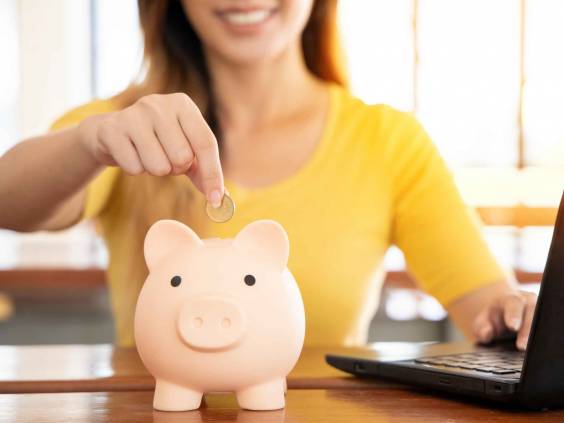We asked three personal finance pros to weigh in on using your refund wisely

Article content
This article was created by MoneyWise. Postmedia and MoneyWise may earn an affiliate commission through links on this page.
Whether you submitted your taxes the minute the Canada Revenue Agency (CRA) started accepting them on Feb. 22 or waited to the very last minute on Apr. 30, the work should be behind you.
Now it’s just a matter of waiting for that refund to hit your account. The pandemic may have shifted your priorities for what to do with it once it does. You could also be one of the millions who got a tax bill this year after receiving COVID benefits.
This year, the average Canadian refund is $1,851, according to CRA data and you may have all kinds of plans on how to spend it.
But before you rush to make a big purchase, we’ve got some tips from some leading money experts for you to consider first.
What to do with your tax refund

Proxima Studio / Shutterstock
MoneyWise talked to MeVest founder Lesley-Anne Scorgie, millennial money expert Jessica Moorhouse and Elleverity Wealth Management founder Zainab Williams about how best to spend your refund.
Advertisement
Story continues below
This advertisement has not loaded yet, but your article continues below.
Article content
To start, Moorhouse and Scorgie caution against thinking of your return as “free money.”
“When you’re getting your refund, it’s really just a sign that you’ve overpaid in taxes,” says Scorgie. “But it does feel like a money party can be had because it’s like extra money so there’s a tendency for us to kind of blow the doors off and go out and spend.”
Before you spend your refund on something you’ll regret, follow these five steps to spend or save that money wisely.
1. Make a plan
For starters, Moorhouse recommends you make a list of all your financial goals and plan how you would spend any kind of windfall — including your savings and investment goals, essential purchases and anything fun.
Then, add a price point for each item, like how much you’d need to set aside in your high-interest savings account to pay for a family vacation.
“It’s a more exciting way of thinking about this money: What do I want to do with this money when I have lots of different options,” says Moorhouse. “Then you can take a look at your list of all the different kinds of price points and see what it would fit into.”
2. Build up your emergency savings

Worranan Junhom / Shutterstock
If you’ve depleted your emergency savings after 15 months of living through lockdowns, all three experts recommend rebuilding that fund before anything else.
“COVID showed us that financial security is a fleeting moment when we don’t have an emergency fund,” says Williams.
For those with stable incomes, Moorhouse suggests setting aside three months of expenses. If your employment is a little iffy, plan for six months’ worth. And for the self-employed, she recommends nine to 12 months.
Advertisement
Story continues below
This advertisement has not loaded yet, but your article continues below.
Article content
3. Deal with debt
Once you’ve dealt with your emergency savings, that’s when you can think about debt.
“When it comes to consumer debt like credit cards or lines of credit, the bulk of the return should be going there,” says Scorgie. “And the reason for that is that it’s expensive to carry so it’s going to feel like a ball and chain around your ankle.”
As for Williams, she suggests prioritizing anything that “drains your net worth” — meaning anything with high interest, like credit cards.
Debt can also affect your credit score. You can monitor your credit score for free online to keep track of that important three-digit number.
4. Contribute to your retirement

Monkey Business Images / Shutterstock
Putting money away for retirement is an essential part of a healthy financial plan.
How much to set aside will be different for everyone.
Some may be on track for their financial goals with just their regular contributions, while Scorgie says others may use this opportunity to catch up if they had to pause their contributions during the past year.
5. Do something for “future you”
Instead of thinking about all the things you have to do with your finances, Moorhouse suggests reframing it as prioritizing taking care of “future you.”
Get away from worrying about what you should do — instead ask yourself what your future self will benefit the most from.
“If you look at your bills and you’ve got a bunch of debt at a really high-interest rate, maybe it’s: ‘Future me would really benefit from not having that monthly payment anymore.’”
Advertisement
Story continues below
This advertisement has not loaded yet, but your article continues below.
Article content
Don’t forget about fun

Dragon Images / Shutterstock
All three money experts emphasize that especially after the year we’ve had, it’s OK to spend a little on yourself. And Williams says you shouldn’t feel any guilt over it.
But keep it reasonable and intentional.
“Sometimes I think COVID makes you want to spend money just as a reaction, almost like a rebellion,” says Moorhouse.
“Take a look at what you actually want to get, figure out what the price point for that is and you may realize you only actually need like $200 and you’d be satisfied.”
What to do if you owe this year
After receiving COVID relief benefits last year, many households are getting a tax bill instead of a refund this year. According to the CRA, the average balance owing is $5,062.
While that may seem like a lot, you have a few options to earn some cash to help pay it off.
- Earn cash every time you shop. Sign up for a free program that offers you real cash back when you make a purchase at your favourite stores and restaurants.
- Make a little on the side. If you’ve got a special talent or skill, why not turn what you do for fun into something you do for funds? Turn your hobby into a profitable side hustle and earn the extra cash you need to pay off your balance to the CRA.
- Invest what you can spare. Even if you’re a total novice with investing or you don’t have much to put into it, there’s an investing option designed just for you. Download an investing app that tailors your portfolio to your needs. Whatever your budget or experience, you can build a portfolio that will earn you some tidy returns to help pay back what you owe in taxes.
This article was created by Wise Publishing, Inc., which provides clear, trustworthy information people can use to take control of their finances. Millions of readers throughout North America have come to count on the Toronto-based company to help them save money, find the best bank accounts, get the best mortgage rates and navigate many other financial matters.
Advertisement
Story continues below
This advertisement has not loaded yet, but your article continues below.
Five things experts say you should do with your tax refund - Financial Post
Read More



No comments:
Post a Comment